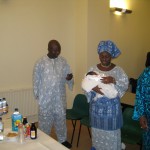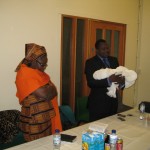Ọpọlọpọ ọmọ Yorùbá ti bẹ̀rẹ̀ si tijú lati jẹ orúkọ ti òbí fi èdè Yorùbá sọ wọn. Èyi tó bá tún gba lati jẹ orúkọ Yorùbá á tún bã jẹ ni kikọ tàbi ni pipè. Èwo ni ká kọ “Bayọ ni Bayor, Fẹmi ni Phemmy, Tọlani ni Thorlani – kilo njẹ bẹ̃? Nigbati ẹni to ni orúkọ bá nbajẹ bawo ni àjòji ṣe lè pe orúkọ na dada? Lẹhin ọdún pipẹ́ itumọ̀ orúkọ ti wọn ba jẹ yi a sọnù.
“Ẹni ti kò bámọ̀ itàn ara rẹ̀, wọn á pe lorúkọ ti ki ṣe tirẹ, á si dáhùn”. Á gbọ́ ti igbà òwò burúkú “Òwò Ẹrú”, ti ilú tó lágbára ra àwọn enia bi ẹni ra ohun ini. Ni àsikò yi, bi wọn bà kó enia lẹ́rú, olówó rẹ á fun lórúkọ nitori ko ma ba ranti ibi ti ó ti ḿbọ̀. Eleyi jẹ ki ó ṣòro fún ẹrú lati mọ ibi ti wọn ti wa lẹhin ti òwò ẹrú pari. Ohun ribiribi ti ẹrú ṣe, kò hàn si àwọn ti ó kù ni ilẹ̀ aláwọ̀-dúdú pé dúdú ti wọn kó lẹ́rú ló ṣẽ, nitori orúkọ ti ó yi padà.
Òwe Yorùbá ni “Ilé làńwò kátó sọmọ lórúkọ”. Ó ṣeni lãnu pé ọpọlọpọ ọmọ Yorùbá kò mọ iyi orúkọ wọn, nitori eyi fúnra wọn ni wọn pa orúkọ wọn da si orúkọ ti wọn kò mọ itumọ̀ rẹ.
- Òbí gbé ọmọ wá fún ìsọmọ lórúkọ– Parent presenting child for naming. Courtesy: @theyorubablog
- Ìkómọ – Naming. Courtesy: @theyorubablog
Ẹ jọ̀wọ́, ẹ maṣe jẹ́ki ẹ̀yà àti èdè Yorùbá parẹ́. “Orúkọ ẹni ni ifihàn ẹni”, ao ni parẹ máyé o (Àṣẹ)
ENGLISH TRANSLATION
A lot of Yoruba indigenes have begun to be ashamed of the Yoruba names their parents given to them on their naming. Some of them who even agreed to continue with such indigenous names are distorting it in spelling and pronunciation. Why spell Bayo as “Bayor”, Femi as “Phemmy”, Tolani as “Thorlani” – what does this new spelling mean? When the owner of a name is distorting it, how then is a stranger supposed to pronounce it well? After many years of distortion, the meaning of the name will be lost.
“Whoever does not know his/her history, would be called a name that does not belong to him/her, and he/she will answer”. It is understandable that people whose name were changed by their slave-masters, had no choice during the illicit slave trade. At that time, when a person is taken into slavery, the slave owner do strip them of their names and replace it with whatever name is convenient in order cut such slaves from their roots. This actually made it difficult for the slaves to trace their roots when slave trade was outlawed and they were set free. All the great inventions by the slaves were not easily identified with the slaves to the remaining Africans who were not enslaved because of the name change.
Yoruba proverb said “One considers circumstances of the home before naming a child”. It is a pity that many Yoruba youngsters are not appreciating their names as a result they are renaming themselves to names that they barely know the meaning.
Please, let us not allow the Yoruba ethnicity and language to be obliterated in the world. “Your name is your identity”, may we not be obliterated among the people of the world. (Amen)
Originally posted 2014-01-21 21:13:32. Republished by Blog Post Promoter




